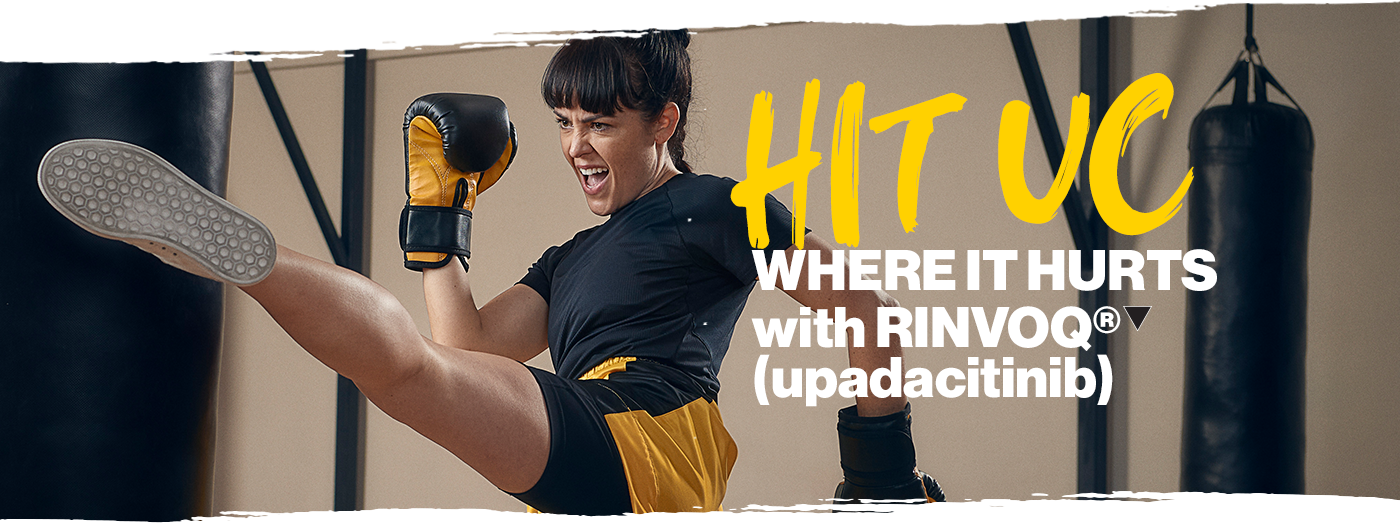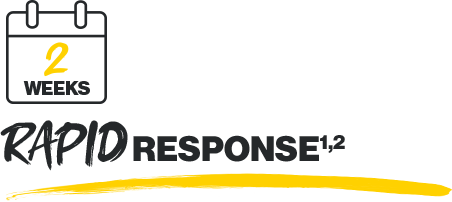RINVOQ® (upadacitinib) is indicated for the treatment of adult patients with moderately to severely active ulcerative colitis (UC) who have had an inadequate response, lost response or were intolerant to either conventional therapy or a biologic agent.1
RINVOQ achieved the primary endpoints of clinical remission per adapted Mayo score at Induction Week 8 and Maintenance Week 521,2
▼ This medicinal product is subject to additional monitoring. This will allow quick identification of new safety information. Healthcare professionals are asked to report any suspected adverse reactions.
RINVOQ is an oral, once-daily, selective and reversible JAK inhibitor approved for the treatment of adult patients with moderately to severely active ulcerative colitis who have had an inadequate response, lost response or were tolerant to either conventional therapy or a biologic agent.1
RINVOQ can be taken at any time of the day, with or without food. Tablets should be swallowed whole and should not be split, crushed, or chewed in order to ensure the entire dose is delivered correctly.1
A Phase 3 clinical trial program involving 3 studies: 2 replicate 8-week induction studies and 1 52-week maintenance study evaluated RINVOQ 45 mg QD vs placebo for induction and RINVOQ 15 mg QD and 30 mg QD vs placebo for maintenance treatment.1,2
Learn more about RINVOQ in our quick introductory video.
RINVOQ achieved the primary endpoints of clinical remission per adapted Mayo score at Induction Week 8 and Maintenance Week 521,2
RINVOQ achieved steroid-free clinical remission per adapted Mayo score at Maintenance Week 52 among those who achieved clinical remission at Induction Week 81,2
aMs: adapted Mayo score; ESS: endoscopic subscore; JAK: Janus kinase; NRI-C: non-responder imputation incorporating multiple imputation to handle missing data due to COVID-19; paMs: partial adapted Mayo score; QD: once daily; RBS: rectal bleeding score; SFS: stool frequency subscore; UC: ulcerative colitis.
Study designs: U-ACHIEVE Induction (UC-1) and U-ACCOMPLISH (UC-2) were replicate induction studies, both of which were multicenter, double-blind, placebo-controlled clinical studies. In UC-1 and UC-2, 988 patients (473 and 515 patients, respectively) were randomized to RINVOQ 45 mg QD or placebo for 8 weeks with a 2:1 treatment allocation ratio and included in the efficacy analysis. All enrolled patients had moderately to severely active UC defined as aMs of 5 to 9 with an ESS of 2 or 3 and demonstrated prior treatment failure including inadequate response, loss of response, or intolerance to prior conventional and/or biologic treatment. U-ACHIEVE Maintenance (UC-3) was a multicenter, double-blind, placebo-controlled clinical study with 451 patient who achieved clinical response per aMs (decrease ≥2 points and ≥30% from baseline and a decrease in RBS ≥1 from baseline or an absolute RBS ≤1) with 8-week RINVOQ 45 mg QD induction treatment. Patients were rerandomized 1:1:1 to receive either RINVOQ 15 mg QD, 30 mg QD, or placebo.1,2
Clinical remission per aMs (primary endpoint): SFS ≤1 and not greater than baseline, RBS=0, ESS 0 or 1 without friability. Clinical response per paMs (symptomatic response; secondary, multiplicity-controlled endpoint): decrease in paMs ≥1 point and ≥30% from baseline, PLUS a decrease in RBS ≥1 or an absolute RBS ≤1. Steroid-free clinical remission (secondary, multiplicity-controlled endpoint): clinical remission per aMs at Week 52 and corticosteroid-free for ≥90 days immediately preceding Week 52 among patients who achieved clinical remission at the end of the induction treatment. Mucosal healing (secondary, multiplicity-controlled endpoint): ESS of 0 or 1 without friability. Histologic-endoscopic mucosal healing (secondary multiplicity-controlled endpoint): ESS 0 or 1 without friability and Geboes ≤3.1. Maintenance of mucosal healing at Maintenance Week 52 (secondary, multiplicity-controlled endpoint): ESS of 0 or 1 without friability at Maintenance Week 52 in patients who achieved mucosal healing with 8-week RINVOQ 45 mg induction treatment (n=216).1,2
Please consult the Summary of Product Characteristics for further details regarding contraindications, monitoring requirements, and additional prescribing information prior to initiating RINVOQ.
Rheumatoid arthritis
RINVOQ is indicated for the treatment of moderate-to-severe active rheumatoid arthritis in adult patients who have responded inadequately to, or who are intolerant to one or more disease-modifying anti-rheumatic drugs (DMARDs). RINVOQ may be used as monotherapy or in combination with methotrexate.
RINVOQ is indicated for the treatment of active non-radiographic axial spondyloarthritis in adult patients with objective signs of inflammation as indicated by elevated C-reactive protein (CRP) and/or magnetic resonance imaging (MRI), who have responded inadequately to nonsteroidal anti-inflammatory drugs (NSAIDs).
[Please insert local summary of safety]
REFERENCES
- RINVOQ [Summary of Product Characteristics]. AbbVie Deutschland GmbH & Co. KG; December 2023.
- Danese S, Vermeire S, Zhou W, et al. Upadacitinib as induction and maintenance therapy for moderately to severely active ulcerative colitis: results from three phase 3, multicentre, double-blind, randomised trials. Lancet. 2022;399(10341):2113-2128. doi:10.1016/S0140-6736(22)00581-5
- Rubbert-Roth A, Enejosa J, Pangan AL, et al. Trial of upadacitinib or abatacept in rheumatoid arthritis. N Engl J Med. 2020;383(16):1511-1521.doi:10.1056/NEJMoa2008250
- Blauvelt A, Teixeira HD, Simpson EL, et al. Efficacy and safety of upadacitinib vs dupilumab in adults with moderate-to-severe atopic dermatitis: a randomized clinical trial. JAMA Dermatol. 2021;157(9):1047-1055. doi:10.1001/jamadermatol.2021.3023



























